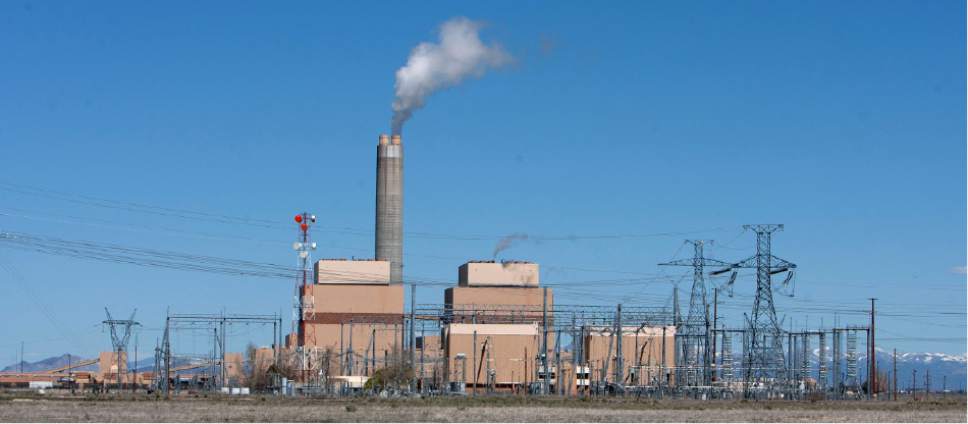This is an archived article that was published on sltrib.com in 2017, and information in the article may be outdated. It is provided only for personal research purposes and may not be reprinted.
California's state ban on coal-fired power has prompted an independent plant in rural Utah to convert to natural gas.
The Intermountain Power Agency, which owns the coal-fired Intermountain Power Project plant in near Delta, announced it has finalized plans to shutter the old coal units in favor of a new natural gas project. Coal-fired operations will cease at the site in 2025, at about the same time the new project comes online, according to the company.
John Ward, a spokesman for Intermountain Power, said last week the move was forced by political dynamics in California.
The 1,800 megawatt plant is technically operated collectively by 35 municipalities — mostly towns and cities in rural Utah and southern California. But the plant's largest customer is Los Angeles, which alongside five other California cities buys the vast majority of Intermountain Power's electricity, Ward said. The disparity between Utah towns' interest in the plant and California's is so large, he said, that "Los Angeles basically runs the plant."
In 2006, California passed a state law strictly limiting how much coal-generated power its municipalities and utilities could buy. In 2013, Los Angeles announced that it would end contracts with several coal-fired power plants, including the Intermountain Plant in Delta, in order to comply with the law.
But rather than pulling out entirely, Los Angeles began work on an agreement that would allow the city to continue to but Intermountain power if the Delta plant were rebuilt to run on natural gas instead of coal.
In a news release issued in 2013, officials with the Los Angeles Department of Water and Power described the deal as a "win-win-win solution that is good for Southern California and good for Utah."
The department declined to comment with contacted by The Salt Lake Tribune for this story.
With its six largest customers set to pull out, Ward said Intermountain Power had no choice but move away from coal. But not everyone is pleased with the development, he said.
"A lot of Utah participants are very pro-coal," Ward said. "but on the other hand, it's the California entities that have purchased all the power."
The transition is likely to deal a blow to communities surrounding the Intermountain plant.
The facility currently requires 440 employees to operate and Ward said that number will grow during the plant overhaul and transition. But the modernized gas plant, when completed, will be slightly smaller but will only employ 150.
He said Intermountain is working to assist those who will lose their jobs after the transition.
"It's not a good news story economically," Ward said, "but it's not as bleak as what you're seeing in some other communities that are seeing coal plants basically shutting down and leaving town."
Delta Mayor Gayle Bunker said he worries about the community's future after the transition. Many of the workers at the coal plant are nearing the end of their careers and may chose to retire rather than seek new jobs — and potentially move away from the town of 3,400 people.
But, Bunker said, the smaller gas plant won't help to attract newcomers to an area already struggling with slow growth and a stagnant economy.
"If the younger people don't have employment, they're going to leave," the Delta mayor said. "That's what has been good about the power plant — it has allowed a lot of our young people to come home and have a job."
Bunker said he also fears the transition may lead to cuts in critical municipal services. The town fire department's budget, he said, is almost entirely funded by Intermountain power, which also contributes significantly to education, raising the possible the town will have to close a school as funding decreases.
"We don't know what's going to happen," Bunker said. "We don't know how it's going to affect us. But I don't see any real strong positives for us."
Bunker said it was disturbing that decisions affecting his community were being made by people who won't have to face the consequences. He praised how the power plant was operated and played down pollution concerns.
"We hardly know it's out there, even though it's not 12 miles north of Delta," the mayor said. "I'm not excited about this happening. I think that they're trying to solve something that isn't a problem."
Twitter: @EmaPen



